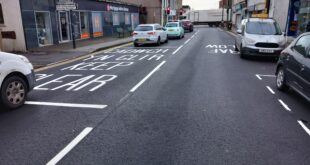The Government has decided to bring forward the ban on new diesel and petrol cars and vans by 10 years, from 2040 to 2030, reports suggest.
The sale of plug-in hybrid electric vehicles (PHEV) would be banned five years’ later in 2035, leaving just 15 years before new cars and vans joining fleets would have to be pure electric.
The RAC believes that the car industry will face a “monumental challenge” to switch production to fully electric vehicles (EVs), while EV charging infrastructure will need to be expanded at an “incredible pace”.
RAC head of roads policy, Nicholas Lyes, explained: “We believe many more rapid charging devices are needed in order to give drivers the confidence that they can make longer journeys in a convenient and time efficient manner.
“While many people, especially those with off-street parking, will charge their vehicles overnight at home, this won’t be possible for everyone so access to a reliable national charging network is vital to make the process of recharging simple and convenient.”
The RAC’s concerns were echoed recently by the boss of Britain’s largest vehicle leasing company, Lex Autolease, who labelled the country’s EV charging infrastructure as “not fit-for-purpose”.
Richard Jones, managing director of Lex Autolease and Black Horse, said parts of the country are poorly served, limiting the wider adoption of EVs.
He explained: “I have people in my business that work all over the UK and we’ve had some real horror stories about charging availability.
“The infrastructure is just not there, particularly once you get outside major urban environments.”
As a plug-in driver himself, Jones says that charging infrastructure lacks any “consistency” and the further north you go, unless you are in a city, the “worse it gets”.
Concerns around charging infrastructure were also the biggest perceived disadvantage to EVs cited in a recent Department for Transport (DfT) survey.
The Department for Transport (DfT) launched a consultation in February on bringing the diesel and petrol ban forward from 2040 to 2035 or earlier and to include hybrids for the first time. That consultation closed on July 31 and the Government has been considering the responses before making an announcement.
The British Vehicle Leasing and Rental Association (BVRLA), in response to the consultation, said Government plans to being forward the ban would fail to recognise the diverse needs of fleet operators, labelling the move a mistake.
However, some of the country’s largest fleets have been calling for the ban to be implemented from 2030. Tesco, Dixons Carphone, E.On, Heathrow, Lime and SSE, have joined a coalition of 27 companies calling on the Government to bring forward a ban on the sale of new petrol and diesel cars and vans to 2030. Royal Mail also joined the coalition last month, saying the fleet industry needed to be more ambitious.
Stuart Simpson, Royal Mail CEO, said: “We want to become a net zero carbon business with a 100% alternative fuel fleet. We want to play a leading role on this agenda. To that end, we are committed to buying more alternative fuel vehicles for our fleet.”
However, alongside concerns around infrastructure, the Institute of the Motor Industry (IMI) says a ban from 2030 would give it 10 years to get at least 55,000 technicians trained.
Steve Nash, CEO of the IMI, said: “Currently, around 5% of UK automotive technicians are adequately trained to work on electric vehicles.
“How do you ramp up electric vehicle adoption if the myriad of users – from private motorists to fleets operating cars and vans, blue light vehicles and more – can’t be confident they will be able to access the expertise to service and repair these vehicles safely?
“To achieve its goal, Government has to recognise that amongst all of those calling for assistance in funding – from manufacturers to those creating the charging network – the basic fundamental of accredited skills needs to come near the front of the queue.
“Users of electrified vehicles want to know that they can hand over their vehicle to someone who has the right skills. Those who aren’t properly trained or equipped to work on electrified vehicles would be risking serious injury or fatality.”
The IMI TechSafe standards, endorsed by OLEV at the end of 2019, mean that EV users can access the IMI Professional Register to check the EV technical competencies of technicians at their local garage.
However, Nash said: “We are currently a long way off achieving a critical mass of technicians qualified, with Covid-19 setting us back significantly in reaching optimum numbers in time for 2035, let alone 2030.
“Government action is needed urgently to encourage automotive employers to re-ignite their EV training plans.”
Barney Goffer, product manager at Teletrac Navman, believes that accelerating the ban to speed up the transition to EVs is a “challenging ambition”.
“Even though great progress is being made, to make sure this target is achievable, the Government and manufacturers need to come together to address the complexities around a lack of charging infrastructure, vehicle pricing and range anxiety,” he said.
“EV technology can move quickly but to make it fit seamlessly into fleet operations and therefore the lives of businesses and consumers is going to take major financial backing by the Government.”
Teletrac Navman is harnessing the power of AI to help its customers see where they can electrify their fleets. Its EV Readiness Tool integrates with Teletrac Navman’s fleet management and tracking platforms and analyses telematics data to provide operators with recommendations of where EVs could be adopted.
An official announcement on ending the sale of new petrol and diesel cars and vans, as well as PHEVs, is expected this week.
Source link



